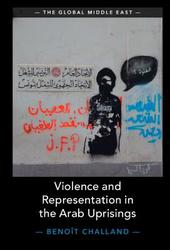
|
Violence and Representation in the Arab Uprisings
Hardback
Main Details
| Title |
Violence and Representation in the Arab Uprisings
|
| Authors and Contributors |
By (author) Benoit Challand
|
| Series | The Global Middle East |
|---|
| Physical Properties |
|
| ISBN/Barcode |
9781108490184
|
| Classifications | Dewey:909.097492708312 |
|---|
| Audience | |
|---|
| Illustrations |
Worked examples or Exercises
|
|
Publishing Details |
| Publisher |
Cambridge University Press
|
| Imprint |
Cambridge University Press
|
| Publication Date |
9 February 2023 |
| Publication Country |
United Kingdom
|
Description
Providing a longue duree perspective on the Arab uprisings of 2011, Benoit Challand narrates the transformation of citizenship in the Arab Middle East, from a condition of latent citizenship in the colonial and post-independence era to the revolutionary dynamics that stimulated democratic participation. Considering the parallel histories of citizenship in Yemen and Tunisia, Challand develops innovative theories of violence and representation that view cultural representations as calls for a decentralized political order and democratic accountability over the security forces. He argues that a new collective imaginary emerged in 2011 when the people represented itself as the only legitimate power able to decide when violence ought to be used to protect all citizens from corrupt power. Shedding light upon uprisings in Yemen and Tunisia, but also elsewhere in the Middle East, this book offers deeper insights into conceptions of violence, representation, and democracy.
Author Biography
Benoit Challand is Associate Professor at the New School for Social Research in New York. He has published widely on civil society in the Middle East, including Palestinian Civil Society: Foreign Donors and the Power to Promote and Exclude (2009), The Arab Uprisings and Foreign Assistance (co-edited with F. Bicchi and S. Heydemann, 2016), and Imagining Europe: Myth, Memory and Identity (co-authored with Chiara Bottici, 2013).
Reviews'Empirically rich and theoretically compelling, Challand's book has much to tell us about how informality generates formal political change, collective imaginaries and "latent citizenship", and how violence, creatively understood, responds to the shackles of what can appear to be an unshakable reality. A splendid work that communicates with theory from the Global South and helps us rethink democratic theory based on the Arab uprisings.' Mohammed Bamyeh, University of Pittsburgh 'An outstanding and unique work which provides the reader with an enticing account of the place of political violence and a fascinating analysis of the role of representation in and around the Arab revolutions. It is an intellectually fluent work which expands our understanding of these events and their aftermath.' Mohammad-Mahmoud Ould Mohamedou, Geneva Graduate Institute 'Benoit Challand, combining historical and contemporary research, brings an original perspective to the analysis of the Arab Spring. Comparing Tunisia and Yemen through their colonial histories and contemporary conflicts, he explores the role of violence in popular protests, their representations in graffiti and the emergence of new forms of citizenship.' Bryan S. Turner, Australian Catholic University and the Graduate Center CUNY
|